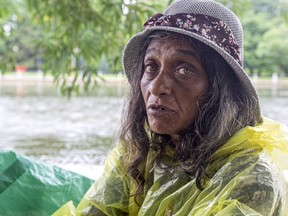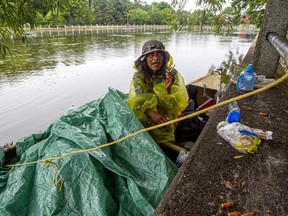For more than a month, Frances DeSilva has slept in her craft on the Rideau Canal.

Article content
Frances DeSilva almost jumped down my throat when I asked her how she got her canoe, suggesting that if I were talking to someone else, someone of means, I would have first asked where they got it, not how. My question, she implied, was actually about how a homeless person could possibly be in possession of a canoe.
Which, I confess, was pretty much true, although what I really wanted to know was why she was living in one, and whether there was a way to help her into more stable housing.
Advertisement 2
Story continues below
Article content
Figuring out how many people in Ottawa are homeless and living rough at any given moment is an imprecise science, but a recent city estimate put it in the neighbourhood of 260. The 60-year-old DeSilva may be the only one living in a canoe. She named hers “Our Boat” — the other part of the “our” referring to her daughter, who doesn’t live in Ottawa — and has called the Rideau Canal home since late May, when, following a severe thunderstorm, “the dogs” took down the tarp she was living under in a thicketed area at Lansdowne Park.
(This, before we return to the canoe, bears explanation. DeSilva speaks lucidly, but her reality often doesn’t match mine. She believes, for example, that tracking microchips are inserted into our bodies via vaccines, a theory to which I don’t subscribe. She also breaks down much of the world’s populace into two groups: the dogs, or those who have power and criminal intentions; and the bones, who have neither. Many people, she said, are both. “I am a homeless Canadian, and poor,” she added. “I am a bone, and the dogs are after me.” This belief consumes much of her thought and actions.)
Advertisement 3
Story continues below
Article content
So a square stern aluminum canoe, purchased at Laurentian Marine Sales with help from her daughter and her daughter’s father, is now her home. She typically moors it under a tree not far from Patterson Creek, a yellow rope tethering it to the canal’s railing. If it rains too much for the tree to provide an adequate shield, she’ll paddle to shelter under the Pretoria Bridge.
A green tarp draped over the canoe, meanwhile, keeps her belongings dry, including clothes, food, cigarettes, her phone, water bottle, a spray can of Lysol and a bar of soap, identification, a yellow plastic rain coat, paddles and life jackets. She charges her phone at Lansdowne Park or the nearby McDonalds, where she also washes. She arranges her diet so she won’t need a toilet in the middle of the night. She receives Ontario Works benefits of approximately $340 a month.
DeSilva arrived in Ottawa about a year and a half ago from Montreal and, before that, Toronto, cities where she says it’s far more difficult to be homeless than here, because of the dogs — i.e. people — who threaten and intimidate the homeless, some even posing as homeless people themselves.
Advertisement 4
Story continues below
Article content
Why a canoe? She explained that after her shelter at Lansdowne, where she’d camped throughout the winter, was destroyed, she decided to move to some slightly more secluded, wooded spot; she firmly believes that being outdoors is healthier for her than being inside. However, she’d still need some conveniences, such as a place to charge her phone. A boat, she felt, made sense, not simply for the mobility, but for security. Like most homeless people I’ve spoken with, DeSilva finds shelters unsafe.
She has an appointment next week with a social worker. After that, she hopes to find a route to relocate to the Rideau River.
“I like being on the boat,” she said. “It’s a very good sleep. It’s comforting. It’s actually very healing.
“This is the best place for me right now.”
That last sentence, and the realization that yes, she probably knows what’s best for her, struck a cord in me.

Coincidentally, as we spoke, a Glebe resident approached, one of many who regularly stop and chat, she said. Jack Heynen is a counsellor and trainer with an interest in consciousness, and has spoken with DeSilva on numerous occasions over the last few months. He described her as “an amazing representative of people who are survivors.”
Advertisement 5
Story continues below
Article content
“It’s fascinating to realize that what keeps her going is that inner awareness,” he said. “There’s a richness within her that says ‘I’m an independent soul. I have my own story as I look at life.’ ”
As I listened to DeSilva, I came to better understand the complexity of homelessness and the multi-headed hydra that is its solution, if such a thing exists. No one should have to endure an Ottawa winter on the street, but our conversation convinced me that before we drop our own templates of what we think is best for people in her or others’ situations, we need to better understand their stories and what they want from their lives. The homeless have increasingly been invited to take part in discussions about matters that affect them. We need to help them do that more often.
All DeSilva wants is to feel safe — and live for another 60 years (which would put her at 120 years old). Officials, she said, have offered her housing options in the past, but she’s repeatedly declined them.
“I say no every time because I know what’s going to happen. They’re going to put me in a worse situation than I was in. I’m never going to stay inside much, and that’s difficult for society.
“I just want to stay outside without having to run from the dogs.”
Our website is your destination for up-to-the-minute news, so make sure to bookmark our homepage and sign up for our newsletters so we can keep you informed
Recommended from Editorial
Article content


Comments